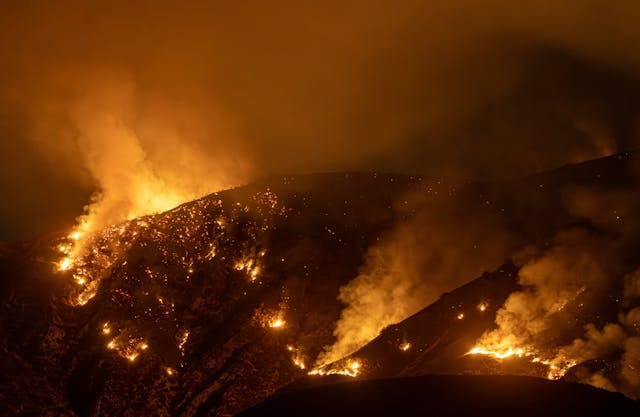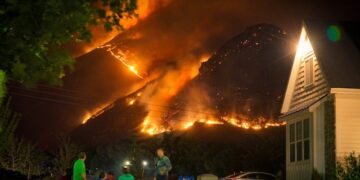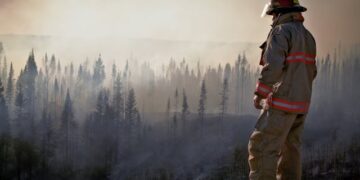Los Angeles is no stranger to wildfires, but in recent years, these natural disasters have become more frequent, more intense, and more devastating. The wildfires in Southern California are no longer just seasonal occurrences; they are stark reminders of the worsening climate crisis. In this article, we will explore the connection between wildfires and climate change, the impacts on Los Angeles, and the urgent need for action to mitigate these disasters.
The Role of Climate Change in Wildfires
Climate change is a key driver behind the increasing frequency and intensity of wildfires in Los Angeles. Rising temperatures have led to prolonged drought conditions in California, drying out vegetation and creating the perfect fuel for fires. Heatwaves have become more severe, and shifting weather patterns have introduced stronger winds, exacerbating fire risks. According to experts, the interplay between rising temperatures and wildfires is one of the most direct impacts of global warming.
A recent study showed that California’s wildfire season is now almost year-round due to climate change. As greenhouse gas emissions continue to rise, the likelihood of catastrophic fires increases. The link between wildfires and climate change is undeniable and serves as a fiery warning of what’s to come if we do not address the climate crisis.
The Impacts of Wildfires on Los Angeles
Environmental Effects
The environmental toll of Southern California wildfires is staggering. These fires destroy ecosystems, devastate wildlife habitats, and release massive amounts of carbon dioxide into the atmosphere. This not only worsens the climate crisis but also hampers recovery efforts by further disrupting the delicate balance of nature.
Social and Health Impacts
For the residents of Los Angeles, the health impacts of wildfire smoke are a growing concern. Smoke and ash from wildfires lead to respiratory problems, especially for vulnerable populations such as children, the elderly, and those with pre-existing conditions. Additionally, wildfires displace thousands of families, forcing them to evacuate their homes and disrupting their lives.
Economic Costs
The economic costs of wildfires in California are immense. From the expenses of firefighting efforts to the costs of rebuilding destroyed communities, the financial burden is overwhelming. Businesses, particularly those in tourism and agriculture, suffer significantly during wildfire seasons, further straining the local economy.
Human Contributions to Wildfire Risk
While climate change is a significant factor, human activities also play a role in increasing wildfire risks. Urban expansion into fire-prone regions in California, known as the wildland-urban interface, has put more lives and properties in danger. Additionally, infrastructure failures, such as utility equipment sparking fires, have contributed to several recent disasters. Mismanagement of forests and overly aggressive fire suppression policies have also created conditions for more severe fires.
Solutions and Mitigation Strategies
Local Actions
Communities in Los Angeles can take steps to reduce wildfire risks by improving wildfire prevention strategies. Early warning systems, fire-safe construction practices, and community education programs are vital. Residents can prepare by creating defensible spaces around their homes and having evacuation plans in place.
Global Actions
On a larger scale, combating the climate crisis and wildfires requires reducing greenhouse gas emissions. Transitioning to renewable energy sources, promoting sustainable practices, and investing in reforestation projects can help mitigate the effects of climate change.
Policy Recommendations
Governments must prioritize climate resilience and disaster response. Policies that support sustainable land management, including controlled burns and vegetation management, can reduce the severity of wildfires. Funding for research and innovation in firefighting technologies is also essential to stay ahead of these growing threats.
Hope and Resilience
Despite the challenges, there is hope. Communities affected by wildfires in Southern California have shown incredible resilience, coming together to rebuild and support one another. Successful recovery efforts from past fires demonstrate that with the right strategies and collective action, it is possible to mitigate future disasters.
Los Angeles and the world must view these wildfires as a wake-up call. By addressing the root causes of climate change and wildfires, we can create a safer, more sustainable future for everyone.
Call to Action
The heat is truly on, but we have the power to make a difference. Support local wildfire prevention efforts, advocate for policies addressing climate change, and take steps to reduce your carbon footprint. Together, we can fight the flames and protect our communities from the devastating impacts of wildfires.









